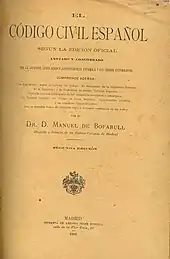Civil Code of Spain
The Civil Code of Spain (Spanish: Código Civil), formally the Royal Decree of 24 July 1889 (Spanish: Real Decreto de 24 de julio de 1889) is the law that regulates the major aspects of Spanish civil law. It is one of the latest civil codes in continental Europe, due to the sociopolitical, religious and territorial tensions that dominated 19th-century Spain. It has been modified numerous times and remains in force to this day.
| Civil Code | |
|---|---|
 | |
| |
| Enacted | 24 July 1889 |
Structure
The structure of the Civil Code is heavily inspired by the French Civil Code of 1804. It is made up of 1976 articles.
- Preliminary Title. Of legal norms, their application and efficacy (articles 1 to 16).
- Book I. Of persons (articles 17 to 332).
- Book II. Of goods, of property and of their modifications (articles 333 to 608).
- Book III. Of the different ways of acquiring property (articles 609 to 1087).
- Book IV. Of obligations and contracts (articles 1088 to 1975).
- Article 1976 is a repeal provision.
- 13 transitional provisions.
- 4 additional provisions.
See also
External links
This article is issued from Wikipedia. The text is licensed under Creative Commons - Attribution - Sharealike. Additional terms may apply for the media files.